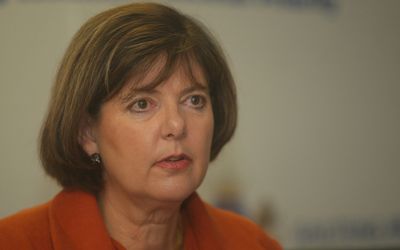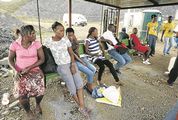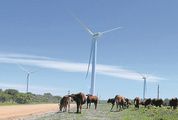THE Gauteng Province will spend R100bn in the 2016-17 financial year to meet its goal of transformation, modernisation and re-industrialisation (TMR).
Finance MEC Barbara Creecy announced this at the tabling of the 2016-17 budget at the Johannesburg legislature.
"Times are tough but we have a plan to fund the implementation of premier David Makhura’s bold programme of radical transformation, modernisation and re-industrialisation," she said.
The budget has increased from R95bn for the 2015-16 financial period.
As part of its plan, the province will change the industrial structure of its economy and focus on manufacturing, mineral beneficiation and agro-processing among other things, Ms Creecy said.
She also said the province would grow small and medium-sized enterprises, revitalise the township economy, invest in skills development and develop new innovation-driven industries.
Gauteng will spend R41.6bn over the next three years on new roads, hospitals, clinics and schools as well as on maintaining existing infrastructure.
The human settlements and education departments will receive the largest share of the infrastructure budget, with human settlements getting R5.2bn and education R3bn.
Other departments that will be allocated money for infrastructure include the roads and transport (R2bn) and the health (R1.9bn) departments.
The province will also spend money on food security and drought relief following the recent drought that has hit the country hard.
Ms Creecy said the department was allocating R777m to the department of agriculture and rural development, R22m would be allocated to agri-parks and milling plants and R176m would go to land and agrarian reform.
Agri-parks are aimed at bringing small, communal and commercial farmers into one place to give them access to training, infrastructure, equipment, logistics and markets.
She said that last year had been "a challenging year for our farmers with a drought that has ravaged farms, livestock and livelihoods ... R33m has been prioritised within the budget to deal with the drought in the province," said the MEC.
Education still receives the largest portion of the budget, with its allocation increasing from R36bn in 2015-16 to R39bn in 2016-17.
The department has also allocated R7bn to public ordinary schools, early childhood development sites, special schools and governing bodies.
Schools will get R2.59bn to provide 1.3-million pupils with a daily meal at school.
Pupils who live more then 5km from their nearest school will be provided with transport that will cost the province R1.69bn.
Higher learning will also receive funding; R1.7bn will go towards the training, development and education of young people.
This includes R1.4bn for bursaries, internships the Youth Placement Programme and partnerships with skills education training authorities.
Also on the province’s list of priorities is paying service providers for their services within 30 days, which has been a big issue for the health and education departments.
Ms Creecy said the treasury department would assist in addressing the issue of late payments.

Gauteng finance MEC Barbara Creecy. Picture: VELI NHLAPO/SOWETAN
THE Gauteng Province will spend R100bn in the 2016-17 financial year to meet its goal of transformation, modernisation and re-industrialisation (TMR).
Finance MEC Barbara Creecy announced this at the tabling of the 2016-17 budget at the Johannesburg legislature.
"Times are tough but we have a plan to fund the implementation of premier David Makhura’s bold programme of radical transformation, modernisation and re-industrialisation," she said.
The budget has increased from R95bn for the 2015-16 financial period.
As part of its plan, the province will change the industrial structure of its economy and focus on manufacturing, mineral beneficiation and agro-processing among other things, Ms Creecy said.
She also said the province would grow small and medium-sized enterprises, revitalise the township economy, invest in skills development and develop new innovation-driven industries.
Gauteng will spend R41.6bn over the next three years on new roads, hospitals, clinics and schools as well as on maintaining existing infrastructure.
The human settlements and education departments will receive the largest share of the infrastructure budget, with human settlements getting R5.2bn and education R3bn.
Other departments that will be allocated money for infrastructure include the roads and transport (R2bn) and the health (R1.9bn) departments.
The province will also spend money on food security and drought relief following the recent drought that has hit the country hard.
Ms Creecy said the department was allocating R777m to the department of agriculture and rural development, R22m would be allocated to agri-parks and milling plants and R176m would go to land and agrarian reform.
Agri-parks are aimed at bringing small, communal and commercial farmers into one place to give them access to training, infrastructure, equipment, logistics and markets.
She said that last year had been "a challenging year for our farmers with a drought that has ravaged farms, livestock and livelihoods ... R33m has been prioritised within the budget to deal with the drought in the province," said the MEC.
Education still receives the largest portion of the budget, with its allocation increasing from R36bn in 2015-16 to R39bn in 2016-17.
The department has also allocated R7bn to public ordinary schools, early childhood development sites, special schools and governing bodies.
Schools will get R2.59bn to provide 1.3-million pupils with a daily meal at school.
Pupils who live more then 5km from their nearest school will be provided with transport that will cost the province R1.69bn.
Higher learning will also receive funding; R1.7bn will go towards the training, development and education of young people.
This includes R1.4bn for bursaries, internships the Youth Placement Programme and partnerships with skills education training authorities.
Also on the province’s list of priorities is paying service providers for their services within 30 days, which has been a big issue for the health and education departments.
Ms Creecy said the treasury department would assist in addressing the issue of late payments.























Change: -0.17%
Change: -0.17%
Change: -1.28%
Change: -0.12%
Change: 0.66%
Data supplied by Profile Data
Change: 1.55%
Change: -0.03%
Change: -0.17%
Change: 0.00%
Change: 0.02%
Data supplied by Profile Data
Change: -1.18%
Change: -0.97%
Change: -1.61%
Change: -1.48%
Change: -0.34%
Data supplied by Profile Data
Change: -0.54%
Change: -0.31%
Change: -0.13%
Change: -0.18%
Change: 1.37%
Data supplied by Profile Data